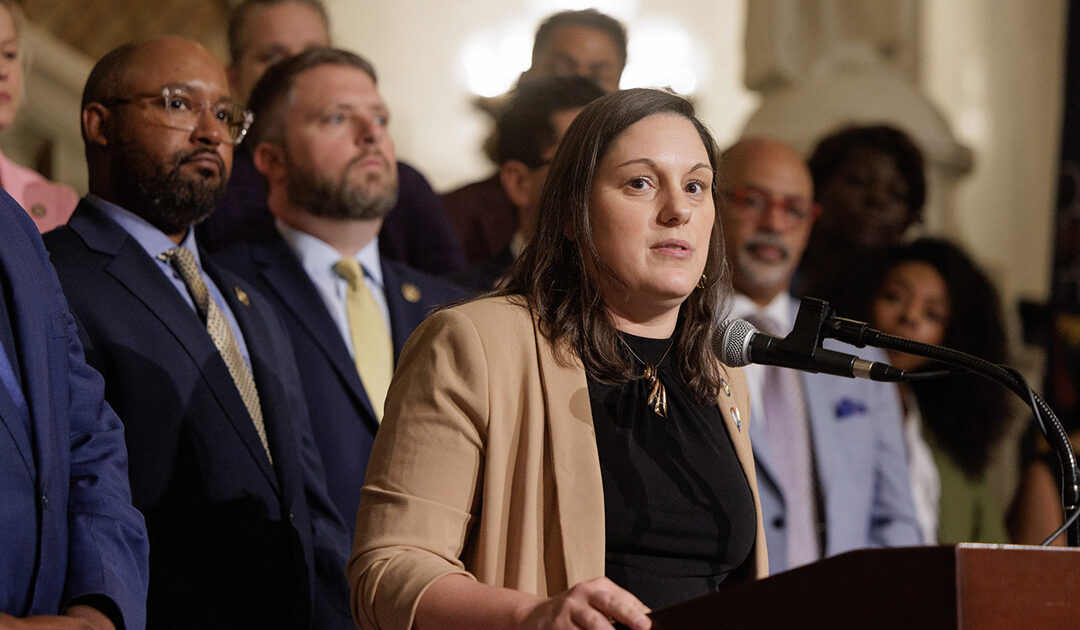Harrisburg, PA − July 2, 2024 − Today State Senators Nikil Saval (D–Philadelphia County), Vincent Hughes (D–Montgomery and Philadelphia Counties), Amanda Cappelletti (D–Delaware and Montgomery Counties), and Tim Kearney (D–Delaware County) announced their intention to introduce legislation preventing the criminalization of homelessness in Pennsylvania.
Their announcement comes in the wake of Friday’s U.S. Supreme Court ruling in Grants Pass v. Johnson, which allows local governments across the country to arrest and punish people for sleeping outside when they have no place else to go.
“Our Commonwealth, like much of our country, faces an unprecedented housing crisis, and this decision by SCOTUS threatens to exacerbate it, putting communities in every county at risk,” said Senator Saval, who serves as democratic chair of the Senate’s Urban Affairs and Housing Committee and chair of the Senate’s Philadelphia Delegation. “We need to fight against the criminalization of our neighbors who cannot afford homes. We need to fight for bold, effective policy responses that move us from treating homes as mere assets to recognizing them as essential material goods. And we need to fight for our public spaces to be inclusive and accessible for all.”
Across the country, stagnant wages and skyrocketing housing costs have caused historic levels of housing insecurity. Nearly a quarter of U.S. homeowners and half of U.S. renters are cost-burdened, leaving them one commonplace emergency away from disaster.
“The stunning lack of empathy and compassion demonstrated by a majority of the Justices on the Supreme Court is what is cruel and unusual,” said Senator Cappelletti, who serves as democratic chair of the Senate’s State Government Committee. “Because of this ruling, anyone who might find themselves unable to afford a place to live could be subject to the criminal justice system. This ruling is unconscionable. Pennsylvanians deserve safe, healthy, affordable homes. There’s no question about that—however, when that is not the reality, we cannot turn to criminalizing people who are already suffering.”
The proposed legislation will clarify that homelessness cannot be criminalized in Pennsylvania. This legislation will seek to guarantee the right to be outside, to incentivize inclusive public space management, and to support local governments in the production of sufficient, appropriate low-barrier housing to accommodate people experiencing homelessness.
Across the country, local bills to criminalize homelessness have been introduced or passed not just in Grants Pass, Oregon, but in California, Utah, Arizona, Nebraska, Oklahoma, Texas, Missouri, Indiana, Kentucky, Tennessee, Georgia, and Florida—red and blue states alike where local governments have moved to abdicate their responsibilities to meet the needs of their people. The decision in the Grants Pass case clears a path for the proliferation of these bills.
“It’s devastating to see the Supreme Court make a decision that targets the most vulnerable among us,” said Senator Kearney, who serves as democratic chair of the Senate’s Local Government Committee and chair of the Senate’s Southeast Delegation. “We cannot stand by as people who are already suffering are punished for their circumstances. This legislation is about compassion and creating real opportunities for stable homes for those experiencing housing instability, while also standing against unjust policies.”
The full co-sponsorship memo for the proposed legislation is available here.
Representatives in the Pennsylvania State House have announced their plans to introduce companion legislation. This legislation is cosponsored by Representatives Ismail Smith-Wade-El (D–Lancaster County), Greg Scott (D–Montgomery County), Lindsay Powell (D–Allegheny County), Napoleon Nelson (D–Montgomery County), Rick Krajewski (D–Philadelphia County), Chris Rabb (D–Philadelphia County), Emily Kinkead (D–Allegheny County), Elizabeth Fiedler (D–Philadelphia County), Heather Boyd (D–Delaware County), Melissa Cerrato (D–Montgomery County), and Tarik Khan (D–Philadelphia County).

